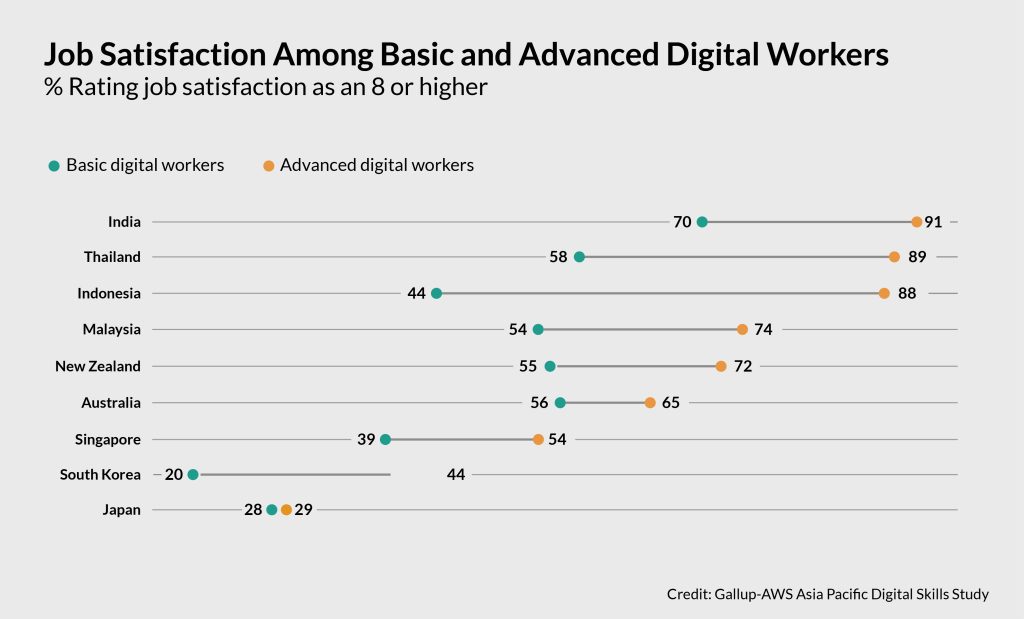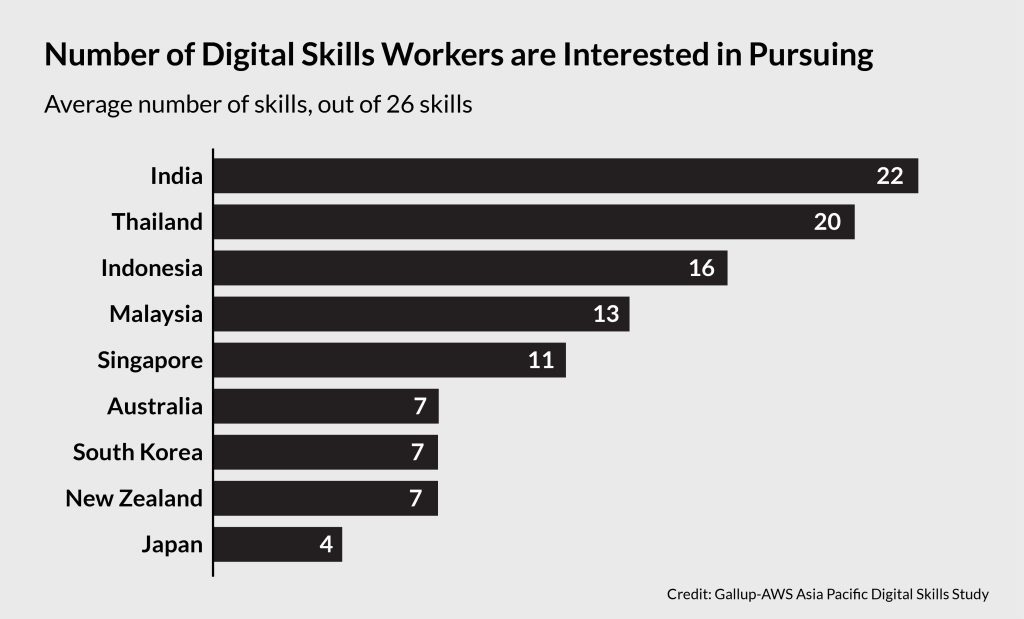
Gallup-AWS study on digital labour market: Global findings vs Indian scenario

What are the salient features of the digital labour market in the global economy today?
An average worker with advanced digital skills in middle-income countries like India reports earning 72% more than similar workers who do not use digital skills.
Nearly three out of four workers (72%) who use advanced digital skills at work express high job satisfaction compared to less than half of the workers who only use basic digital skills (43%).
Workers with advanced digital skills express higher confidence in their job security than those with basic digital skills (72% versus 48%).
Companies with high levels of digital skill utilization report 168% higher annual revenues compared to companies that do not use digital skills.
As many as 66% of employers say it is highly likely that at least one of the 10 emerging technologies—like metaverse, blockchain, artificial intelligence, and cloud computing—will become part of their operations in the coming days.
These are some of the findings of a Gallup-Amazon Web Services (AWS) study based on surveying 30,000 digital workers and 9,000 employers of digital firms spread across 19 countries, including the USA, Canada, China, the UK, Germany, India, and Brazil.
Additionally, Gallup analysed advertisements for jobs for around 100 million vacancies in 33 countries to ascertain the demand for the kind of digital skills and how much payment was on offer. These findings have been listed in three reports by AWS—a global digital skills report, a report for the Asia-Pacific region, and a report for Australia.
To what extent do these global findings correspond with the Indian digital skill scenario? To ascertain this, The Federal talked to some techies and digitech academics from Hyderabad, Bangalore, National Capital Region, and Chennai. Their feedback has been summarised below.
The digital skills scenario in Indian tech hubs
Wage spread
The wage differentials in major Indian tech hubs appear to be sharper. Mahalakshmi, who worked as a software developer in Infosys, Bangalore, told The Federal: “The average salary for a fresher, with a BTech degree in computer science from an ordinary engineering college, in an established large firm in Bangalore or Hyderabad, starts at Rs 3.6 lakh per year and it can be as low as Rs 2.4 lakh per year in a small IT firm. However, an IIT graduate in computer science earns Rs 7 lakh per year at the entry-level but top-rankers may earn up to Rs 12 lakh. Bonus, performance incentives, and other perks might range from Rs 40,000 to Rs 1 lakh but they may or may not repeat annually.”
In contrast, a non-engineering graduate apprentice trainee in a public sector firm like Neyveli Lignite Corporation earns Rs 1.5 lakh a year and junior engineer with a bachelor’s degree in civil or mechanical engineering earns around Rs 4 lakh a year at the entry-level. Assuming that an IIT graduate in computer science would possess advanced digital skills needed for work in artificial intelligence or software programming unlike an ordinary engineer without such digital skills, the wage differentials can range up to 300%, much more than the figure of 92% (or Rs 1.4 lakh in absolute terms) for India mentioned in the report for Asia-Pacific region based on the AWS study.
Professor Harjinder Singh, from the Centre for Computational Natural Sciences and Bioinformatics of the Indian Institute of Information Technology (IIIT), told The Federal, “In Hyderabad, those working in large companies like Microsoft, Google, Wipro, etc., have better wages than those working in other smaller companies. Within a company, wage differential exists depending on the nature of the projects one is allowed to work on. Generally, top-level IT workers get inflated salaries. They mostly manage relatively low-paid lower-level workers doing mundane software services for MNCs. Sometimes, the wages of a young engineer can be as low as a senior house-keeping staff. However, there are research divisions in companies like Microsoft and Google that are mostly focused on deliverable outputs as opposed to open-ended work in Western countries, and the payment is higher in these divisions,” he added.
Also read: Budget 2023: Focus on AI technologies in education, ed-tech sector welcomes digital initiatives
Professor Murugan, who teaches at Vellore Institute of Technology, says, “Experience does have an influence on the wage fixation. Experience helps in skill enhancement and also provides the necessary soft skills to manage various situations and, hence, is recognised in wage fixation.”
Vaibhav Maini, a computer engineer working in HCL in Noida, says the gender-wage divide in NCR companies is not much. Harjinder Singh, however, says that women struggle hard to get wage parity with men in Hyderabad and points out that the number of women at top levels is extremely low.
A former employee of Infosys says that big companies in Bangalore used to give poor quarterly ratings to employees in the lower rungs so that they could avoid a salary hike and delay promotion. There are no objective criteria for ratings, and skills make no difference to these ratings. Pay remained stagnant for long, forcing workers to switch to other companies offering higher pay packages.
Job satisfaction and job security

IT jobs in India are still associated with glitter and glitz. But once in the job, the average digital worker is unhappy. That is mainly because s/he is overworked. There is also workplace bullying to some extent. Only a small section is satisfied with their salary levels. Workplace experience is full of daily hassles. Some surveys before the pandemic revealed that most tech workers were keen on switching their jobs and moving to a different company. “A few of our graduates come back to academia after a few years of stint in industry; obviously, they do not have job satisfaction,” says Harjinder Singh.
Job satisfaction is also associated with job security. The Amazon study shows that higher skills are associated with greater job security. But, in the face of a recession creeping in and tech layoffs, uncertainty looms large across all skill levels, leading to anxiety and poor job satisfaction.
“Greater job security arising from higher digital skills used to be the case earlier in the Chennai IT Corridor. But it no longer holds true in the face of the IT crisis. Even established IT companies have started downsizing, anticipating a tech recession, and those in high salary brackets also become victims,” says Murugan.
High skills and high revenues
The AWS study suggests that higher revenues for companies are associated with employment of workers with higher digital skills. In India, companies with higher revenue due to higher digital skills are the tech giants concentrated more in Hyderabad. Strangely, the traditional IT biggies in the original IT capital, Bangalore, earn the bulk of their revenue by doing mundane job orders for MNCs.
Skill gap and reskilling
Thanks to constantly evolving digital technologies, in all industries based on digital technologies, there is a gap between available skills among employees and the skills required by the changing nature of the work. This skill gap is rooted in the gap between technology needs of the industry and the imparting of these necessary advanced skills in colleges. No wonder, Infosys founder Narayan Murthy once aptly commented that 75% of graduates turned out by Indian engineering colleges were “unemployable”.
Also read: From AI centres to National Data Governance Policy, Budget drives digital agenda
Ashokrajan, manager in an IT company in Chennai, says the skill gap is narrowing thanks to online learning platforms. Another IT worker and a member of Forum for IT Employees (FITE, a union for IT workers) commented, “In Chennai, the skill gap leads to two different outcomes—re-skilling, on the one hand, and layoffs, on the other. Re-skilling, however, takes place depending upon the requirement of the project undertaken. Where the termination costs work out cheaper then re-skilling costs, the companies terminate the services of highly paid experienced workers only to recruit qualified freshers in their place for lesser salaries.”
Skill shortage

A representative from Great Learning, a leading edtech company, told The Federal, “There is a skill shortage in the digitech industry, especially for people in the experience levels of 4–7 years. However, there is huge excess capacity of freshers in the 0–1-year experience category. Jobs for senior and top management slots are scarce, as most companies are optimising their staff due to the current recession trend. Typical digital skills in demand are full-stack engineers (i.e., software engineers of a higher order in Java, .Net, SDET), Cloud professionals (AWS, GCP, Azure), and data engineers. Companies are investing heavily in training people for the above skills as there is scarcity.”
Skills in frontier technologies
The digital skill reports of the Amazon Web Service identify 5G, artificial intelligence, metaverse, blockchain, and Web 3.0 as frontier areas of higher digital technologies. How widespread are these technologies in Indian tech hubs? He says, “These emerging technologies came with a big promise and almost every organization started gearing up to prepare a talent pool for these. While numerous projects are going on in 5G, blockchain, and artificial intelligence/machine learning, the growth is much lower than anticipated. These technologies have a big potential and are expected to scale up to the next level in a couple of years. Maybe, the global recession has slowed down projects.”
Also read: Workers with advanced digital skills contributed ₹10.9 lakh crore to India’s GDP: Study
“Not much hiring has started yet for metaverse, 5G, and blockchain, as most of these projects are either small or are still in the research and development stage. Organizations are trying to train their existing staff on these technologies and going to market for projects. It is a chicken and egg story. They don’t want to hire in bulk for these skills till real projects come. Hence, the companies are being conservative and are using training to build the internal human resources,” he further added.
Systematic studies of the Indian digital labour market are quite rare. Generalised global or regional reports, like that of Amazon Web Service, have their limitations in comprehensively covering the digital high-tech labour market in individual countries. The account given above is a summary of opinions of individuals, and some of them are tentative in nature. They only underline the need for a more rigorous quantitative study. Hopefully, institutions like NASSCOM would fulfil such a need.

